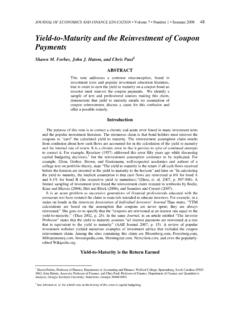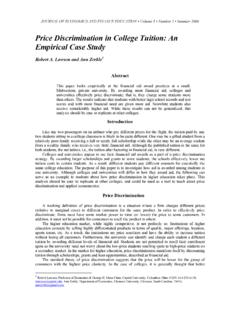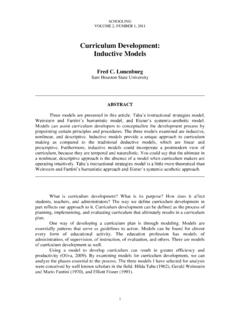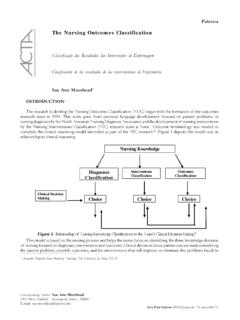Transcription of A Theoretical Discussion on Financial Theory
1 JOURNAL OF ECONOMICS AND FINANCE EDUCATION Volume 4 Number 2 Winter 2005 39 A Theoretical Discussion on Financial Theory : What Should We Teach and How? S. J. Chang* ABSTRACT This essay addresses some of the critical and cohesive teaching philosophies regarding finance Theory education in an effort to rekindle and increase our awareness thereof in the wake of rapid advancement and propagation of technology-based practical skills training, which appears to increasingly discount the usefulness of classroom-taught theories. Recognizing the significance of fostering problem-identifying ability in today's Financial management, the paper advocates the importance of Theory education in finance.
2 Renewed attention to the issue should help reshape finance education for the better in this rapidly changing environment. Introduction As a separate subject of discipline, finance is still in its infancy. It was only the latter half of the twentieth century that witnessed most of major developments in finance with scientific This means that the whole profession of finance had to digest a very large amount of new Theoretical developments in a relatively short time period. Teachers, students, and business people have been continuously introduced to new models, theories, and empirical results thereof over the recent years and the trend continues.
3 Started out as largely a descriptive, institutional field of study, finance has quickly transformed into a science full of Theoretical thrusts. While few would dispute its origin as a branch of applied microeconomics, finance now is as Theoretical as its mother The rapid changes in finance have had a profound implication for business education. Especially, such extensive and rigorous Theoretical developments over the recent past have made finance teaching in college classrooms increasingly chal-lenging. Finance is one of the most quantified and theorized disciplines in business curriculum.
4 The dynamic and complex nature of finance requires continuous development of new theories. As intellectual advances in finance continues in the form of more sophisticated Theoretical inquiries, the challenge of teaching finance theories will only grow bigger. Yet, finance is somewhat unique in terms of the correspondence between Theory and evidence. While we educate students to make independent critical evaluations of the contending points of views, many finance theories are still at their developmental stage and so they are highly controversial, debatable, and subject to close This poses as the very first problem to a finance instructor What particular theories and models should be taught?
5 * S. J. Chang is Professor of Finance, Illinois State University, Normal, IL. Email: 1 Although some might think otherwise, many seem to agree that the historical demarcation point for today's finance was the work of Markowitz (1952) and Modigliani and Miller (1958). See Miller (1998, ), Weston (1981, ), and Martin et al. (1988, ). 2 Miller (1998, ) described the phenomenal developments in finance by saying, In the forty years since then, the field has come to surpass many, perhaps even most, of the more traditional fields of in the quality and quantity of combined scholarly output.
6 3 The Efficient Market Theory presented by Fama (1970) is a prime example. The Theory is critically opposed by, among others, a group of finance scholars known as behavioralists. While largely refuting this criticism, Ball (1994) admits that the Theory has obvious limitations. He further notes that with a limited tradition the much of the evidence on stock price behavior cannot reliably address the issue of efficiency. On the other hand, Miller (1998) recognizes the Efficient Market Theory as one of the major works that JOURNAL OF ECONOMICS AND FINANCE EDUCATION Volume 4 Number 2 Winter 2005 40 Finance textbooks today have a fairly common coverage of theories and models.
7 In addition to such Nobel-winning theories as the Portfolio Theory , the M&M Irrelevance Theorems, the Capital Asset Pricing model , and the Option Pricing Models, a typical finance textbook carries other Theoretical works such as the Efficient Market Theory , the Dividend Discount model , the Arbitrage Pricing Theory , and the theories about agency costs and information signaling. Nevertheless, individual instructors still have to determine the extent and depth of coverage, the level of difficulty, and the philosophy of addressing the issues. Over the last several decades there has been an outcry that Theory -oriented analytical subjects, such as finance, should make way for more important, newly emerging subjects such as leadership, communication, ethics, global management perspectives, technology, and other soft skills.
8 Besides, the rapid and widespread propagation of educational technology places an increasingly heavy weight on learning and mastering practical capabilities such as spreadsheet skills and thereby disregarding Theoretical learning approaches. In the wake of these developments, finance instructors may well feel embarrassed and even frustrated because finance textbooks are still criss-crossed by theories and models. So, questions arise. Are we overteaching finance theories? Are finance theories of any use and help in today s environment? Should we continue to teach them? If so, how?
9 Just as these questions sound all too familiar and obvious, so should the answers. The only problem seems to be how often and easily we forget the importance of Theory education. So, this essay once again reminds finance teachers of a long-cherished but oft-forgotten educational philosophy in its essence education is a quest for better theories. As long as we keep finance education within the confines of ivory tower, we should diligently and continuously teach finance theories, and we should do it the right way. Necessity of Financial Theory Education It is almost a tautology to start anew a Discussion about the necessity of Theory instruction.
10 That is because the answer to why we teach and learn theories must be general in that it applies to all areas of study physics, sociology, engineering, finance, and so forth. Theories are an essential part of education. Winds of change may be sweeping the globe right now. But our belief in this fundamental educational idea may never change. If we just feed students guidelines to cope with routine problems, we are giving vocational training, not real education. Although they are often used interchangeably, we should not confuse education with training. If we take education as an intellectual process that makes people hear more when they listen, reach deeper when they think, and say more when they speak (McDonald 1988), then education must be different from, and more than, simple repetitive training.






